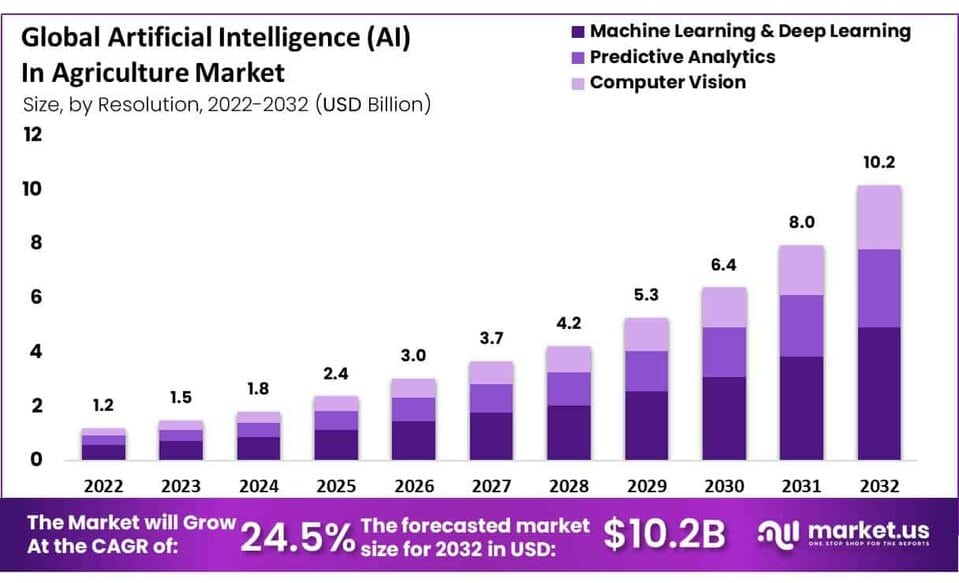AI in Agriculture Market: Cultivating Smarter, Sustainable Farming
|
The global AI in Agriculture market is poised to grow significantly, reaching approximately USD 10.2 billion by 2032 from USD 1.5 billion in 2023, registering a CAGR of 24.5%. This growth is fueled by rising food demand, climate unpredictability, labor shortages, and the push for sustainable practices. AI technologies are revolutionizing agricultural operations by enabling precision farming, real-time monitoring, predictive analytics, and automated decision-making. Farmers and agribusinesses are increasingly adopting AI to enhance yields, reduce costs, and minimize environmental impact, transforming traditional agriculture into a digitally enabled and more productive sector.
Key Takeaways: Market to grow from USD 1.5B in 2023 to USD 10.2B by 2032 CAGR of 24.5% expected during 2022–2032 Precision farming and crop health monitoring are primary growth drivers High adoption across North America, led by advanced tech infrastructure AI-driven drones and sensors widely used for soil, crop, and weather analytics Demand fueled by labor shortages and need for efficiency Rising use in livestock management and irrigation optimization Strong investment in agri-tech and AI startups Cloud-based solutions enable scalability and remote monitoring Government support accelerating adoption, especially in Asia-Pacific Dominant Market Position: North America leads the global AI in Agriculture market due to its mature digital infrastructure, strong investment landscape, and early adoption of precision agriculture practices. The region benefits from widespread use of smart farming equipment and favorable government initiatives supporting agri-tech innovation. Europe follows with a sustainability-driven approach and increased focus on climate-smart farming. Asia-Pacific is rapidly expanding, driven by the modernization of traditional farming in populous nations like China and India. These regions are seeing a rise in AI adoption for crop forecasting, soil monitoring, and yield optimization, contributing significantly to the overall market expansion. Technology Perspective: The market is driven by the integration of AI with machine learning, computer vision, robotics, and IoT. AI models analyze data from sensors, drones, and satellite imagery to provide insights on crop health, irrigation needs, and pest outbreaks. Robotics is enabling autonomous seeding, spraying, and harvesting. Machine learning algorithms support yield forecasting and resource planning. IoT devices ensure real-time monitoring of soil conditions and climate. Cloud and edge computing enable efficient data processing, while NLP-powered chatbots offer localized farming advice. These technologies are converging to create intelligent, adaptive farming systems tailored to both large-scale and smallholder farms. Dynamic Landscape: The AI in Agriculture sector is witnessing rapid transformation with increasing collaborations among tech firms, startups, and agricultural institutions. The entry of AI into traditional farming ecosystems is reshaping operational models, with scalable solutions addressing region-specific challenges and accelerating digital transformation across rural economies. Drivers, Restraints, Opportunities, Challenges: Drivers: Increasing food demand, shrinking arable land, and climate change. Restraints: High deployment costs and limited tech access in rural areas. Opportunities: AI-based precision farming and rural digital inclusion. Challenges: Data quality, infrastructure gaps, and farmer training. Use Cases: Crop disease detection using drone and satellite imagery Yield prediction and weather forecasting through AI analytics Smart irrigation systems that optimize water usage Automated tractors and harvesters in large-scale farms Livestock health and breeding monitoring AI chatbots for multilingual farmer support Market trend analysis for pricing and distribution Weed detection and targeted pesticide spraying Real-time soil fertility and nutrient analysis Greenhouse automation for temperature and light control Key Players Analysis: Vendors in this space range from global tech firms to agri-focused startups, offering end-to-end AI platforms for precision farming, data analytics, and automation. Their solutions integrate AI with drones, IoT sensors, robotics, and cloud infrastructure. Differentiation lies in model accuracy, scalability, multilingual support, and regional adaptability. Strategic partnerships with governments and NGOs enable deeper market penetration. Companies are also investing in AI for sustainable farming and carbon footprint reduction. Vendor competition is intensifying around ease of deployment, modular platforms, and affordability for smallholder farmers. Continuous innovation in real-time data processing and predictive intelligence remains a critical success factor. Recent Developments: Deployment of AI-powered crop-scouting drones across Asia Launch of autonomous harvesting robots for high-value crops Partnerships for AI-based soil monitoring systems in Africa Government-funded precision farming projects in North America Expansion of AI chatbot tools for rural advisory services Conclusion: AI in Agriculture is set to redefine global farming through increased efficiency, sustainability, and data-driven decision-making. From precision irrigation to disease forecasting, AI offers impactful solutions to age-old challenges. As more stakeholders recognize its transformative potential, the market is expected to expand rapidly. However, addressing cost barriers, connectivity gaps, and education remains key. With continued innovation and supportive policies, AI is positioned to become a foundational pillar of future-ready agriculture, enabling better yields, healthier ecosystems, and resilient food systems worldwide. Read More : https://market.us/report/applied-ai-in-agriculture-market/ 
|
«
Return to OFBiz
|
1 view|%1 views
| Free forum by Nabble | Edit this page |

